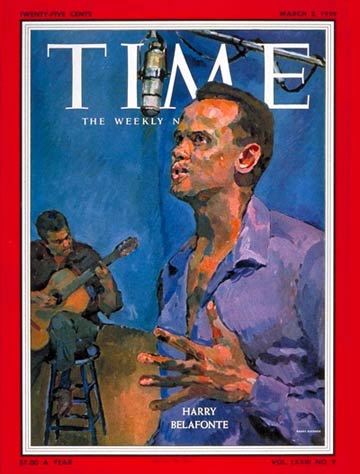
Harry Belafonte
(6 of 8)
Hash &. Eggs. Harry and his wife moved into a tiny $55-a-month apartment in Harlem with Marguerite's mother, lived for the first few months on Marguerite's salary as a teacher at Bethany Day Nursery. Marguerite remembers Harry in those days—the subway-riding days —as "a big, playful animal." A friend. Painter Matthew Feinman, remembers that he was seething with racial feeling. The two of them played chess, and when they were arranging the chessmen, Harry used to say: "I'm taking the black ones, man, because they're better than the white; they're the best, man."
Jobs in the theater were hard to come by when Harry Belafonte left dramatic school in 1948. He took a job as a messenger and package wrapper in the garment district; nights he used to drop in at a Broadway jazz cellar known as the Royal Roost. He learned a few songs—Star Dust, Blue Moon, Pennies from Heaven—and landed a job. He made some recordings, even composed a quavering ballad titled Lean on Me ("You in your high ivory tower/ Drunk with the sense of your power/ I adore you/ Do I bore you? Come, come le-ean on me"). One night, when he was playing the Five O'Clock Club in Miami at $300 a week, he chucked pop singing "like a thief in the night.'' Says he: "What I was singing was junk."
For eight months, with Negro Writer William Attaway and Negro Actor Ferman Phillips, Belafonte operated an eatery in Greenwich Village called the Sage. Says Harry: "I did the cooking in the window. All kinds of people flocked in—folk singers, junkies. We gave them hash. If you were lucky, we threw an egg on it." Afterhours, Belafonte and his pals started to organize a folk-singing group. Says Attaway: "We wouldn't even open the door unless we needed somebody. The guy would rap, and we would open up and say: 'O.K., we need a bass, you can come in.' " The Sage failed (the three partners used to try to raise the payroll for the help by sitting in on a weekly poker game) and Belafonte wangled a four-week engagement at the Village Vanguard. It stretched to 22 weeks. Guitarist Millard Thomas joined the act. "I didn't have any of the accepted requirements," says
Belafonte. "The audience just accepted Millard and me. He had his shirt and I had mine." Marguerite Belafonte remembers the chain—"the Vanguard, the Blue Angel, the Black Orchid in Chicago, the Chase Hotel in St. Louis—and straight to the sky." Belafonte got parts in John Murray Anderson's Almanac on Broadway and in the movie Carmen Jones. Then one RCA Victor album—Belafonte Sings of the Caribbean—transformed Belafonte from a nightclub headliner into an international show-business celebrity.
